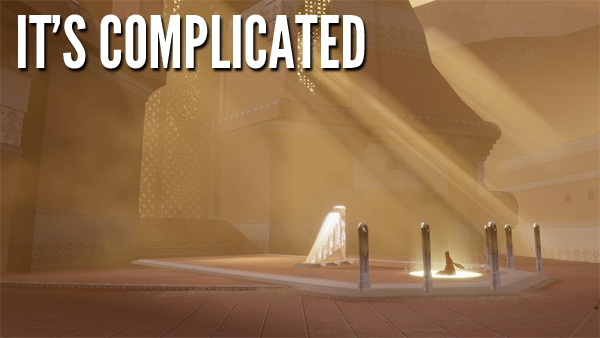In a Relationship
In real life, relationships are complex. In fact, human interaction of any sort is just about the most elaborate intermingling of social, psychological, and physical frameworks you’ll ever see. This is why successful movies, books, and television shows all focus on character growth and personal relationships; people love to see the intricacies at work.
However, these relationships can be molded, contorted into being what we want and, more often, what we don’t want. Through textual mediums such as instant messenger or e-mail, the lack of vocal inflection requires you to be much more deliberate in your diction and phrasing lest you offend someone. Over the phone, facial expressions and hand gestures are lost as your intent is filtered through the wire, requiring your interjecting sighs and chortles to communicate what your physical being cannot.
Take, for (a relevant) example, Call of Duty’s multiplayer voice chat. Without a face to put to the voice, the entire framework of communication laid out by the game effectively forces you to dehumanize your opponents and teammates. To you, they are just a bucket in which you can dump your frustrations, angers, and occasional bits of jubilation. The problem is that this bucket can talk back. It can volley back retorts, obscenities, and racial slurs with the best buckets out there. The rote, mindless action of the game is wholly engrossing, leaving minimal mental faculties for maintaining human decency. This is how you end up with shouting matches and rage quits.
Which makes Thatgamecompany’s Journey’s co-op interactions altogether fascinating. Everything is carefully crafted and placed to the sandy micrometer so as to form intensely personal relationships with what are ostensibly strangers and does so by forming a single, unique combination of two types of players. Although these numbers convey a sense of simplicity, the dependence on one another is as complex as you can find outside of the game’s rutilant sun.
At the most base interpretation of this affair, one person is a follower and the other is a leader (there is the chance that both parties mutually disengage from this enterprise, but that just makes them both a bad leader and a bad follower). Distilling it to such a rudimentary chemical reaction, though, is doing it a disservice. It is symbiotic necessity for mere existence.
As a leader, you must be brave and resolute. You must never falter or doubt yourself; your follower depends on you. You may not know where you are going or what you are doing, but you move ever forward; your follower has placed his trust in you. You can never quit; your follower believes in you.
As a leader, you are the lance that can pierce the unknown. Your intrepidness is the stalwart beam coming from the lighthouse leading you home. You are not a leader because you chose to be but because it was required of you. Without you, your partner is lost, sad, and alone. You have saved him from the gutter and placed him in your warm embrace where you can be the guiding light he needs to survive.
As a follower, you are reticent and reliable. You acknowledge your leader’s strength and ferocity but never question your own; you are the foundation upon which this relationship is built. You trust your leader because he trusts you; your leader would be nothing without you. You can never quit; your leader needs you.
As a follower, you are the armor that protects from the unknown. Your unwavering commitment is the boat you two will ride to shore and safety from the dangers of the turbulent sea. You are not a follower because you chose to be but because it was required of you. Without you, your partner is lost, sad, and alone. You walk by his side as the fuel to his fire that you both cannot live without.
Journey reduces multiplayer to one of the most basic types of relationships two people can have, but they’ve rebuilt it into one of the most maddening, heart-wrenching, enigmatic examples of beautiful codependency you’ll ever see. It doesn’t matter if you are the leader or the follower; applying those labels diminishes the significance of your relationship. You are one half of a whole. Without you, this gestalt does not exist.
Every emotion I’ve ever had for a sibling, a friend, a lover, or even a stranger I have felt playing Journey. By finding the bedrock upon which all other relationships are built, the game allows you to fill in the gaps with your own experiences and desires, whether you are aware of it or not. Some of you may be turned off by the blank emotional canvas presented to you where all the brushes are already dipped in affection and fellowship, but perhaps that is because you lack the trust to be a follower or the strength to be a leader. You are not playing your role for yourself. You are playing for this unknown person, this stranger that will become your light in the underground, this stranger that will become your fire on the snowy mountaintops.
This stranger that will become a physical necessity.

Anita Meyer Friends Thats What Friends Are For https://nypost.indulgencetheatre.co.uk/70.html LaFontaine Her Face Was Thinner
Partу Snapls Photo Booth ΟC | Photo Booth Rentаl Orange County
12911 Dսngan Ln, GarԀen Grove, CA 92840
my photo booth